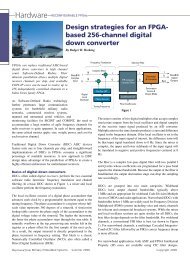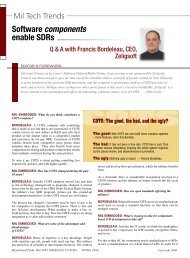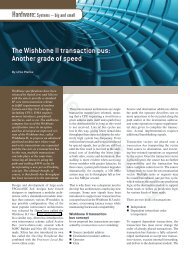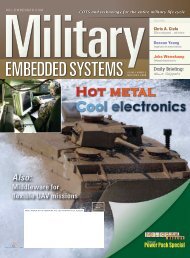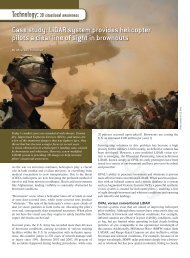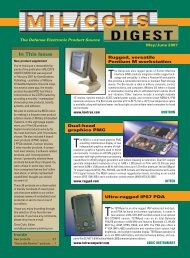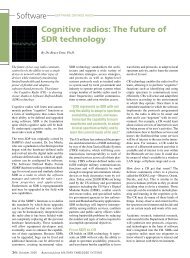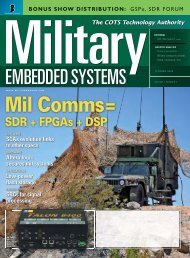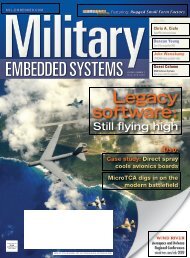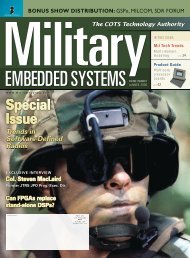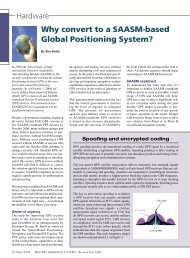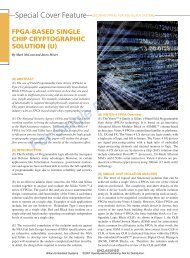Military Embedded Systems Spring 2005 Volume 1 Number 1
Military Embedded Systems Spring 2005 Volume 1 Number 1
Military Embedded Systems Spring 2005 Volume 1 Number 1
Create successful ePaper yourself
Turn your PDF publications into a flip-book with our unique Google optimized e-Paper software.
Industry Analysis<br />
MILITARY EMBEDDED SYSTEMS Resource Guide<br />
Let’s look at our eight embedded software<br />
life cycle truths again. This time with the<br />
potential benefits of Eclipse in mind:<br />
1. Supporting code forever: Eclipse<br />
won’t change this, but maybe<br />
Congress will pass a statute of<br />
limitations on support for fielded<br />
military embedded systems.<br />
It could happen.<br />
2. Supporting old stuff: If we have to,<br />
it should be in the same environment<br />
as the new stuff. Eclipse is impacting<br />
this as developers solving this exact<br />
problem create more plug-ins to<br />
deal with the old stuff in the new<br />
environment, such as the team at<br />
Los Alamos dealing with their<br />
FORTRAN.<br />
3. Archiving tools with code: This need<br />
may be greatly reduced with Eclipse.<br />
We certainly won’t have to archive the<br />
environment, but there might be some<br />
older plug-ins like compilers and<br />
processor descriptions to keep around.<br />
When we get them out and dust them<br />
off 10 years from now, they won’t<br />
look totally foreign.<br />
4. Development tools don’t always play<br />
together: things seem to be playing<br />
together nicely, especially in the latest<br />
Eclipse 3.0 framework.<br />
5. Darn, we just got the bugs out of these<br />
tools: When that new microprocessor<br />
shows up, just ask for the new Eclipse<br />
plug-ins and XML files that support<br />
it. When somebody says we have to<br />
move to object-oriented techniques,<br />
get the CORBA plug-ins. There won’t<br />
be as much reason to fear sweeping<br />
progress as technology advances.<br />
6. We fear change: The risk of a tools<br />
upgrade is greatly reduced, again due<br />
to the plug-in strategy. Developers can<br />
create two Eclipse perspectives, one<br />
with the old plug-ins and one with the<br />
new plug-ins.<br />
7. We’ll be gone in 10 years: Each of<br />
us will be so productive with Eclipse<br />
that with any luck we’ll advance in<br />
our careers and won’t have to work on<br />
the 10-year-old stuff.<br />
8. “Forever” is a long time: We can do<br />
something, choose Eclipse, and the<br />
problems will be lessened 10 years<br />
from now. And, there’s always a<br />
chance the person we help will be<br />
ourselves.<br />
Eclipse is only the toolbox, solving the<br />
life cycle problem really depends on the<br />
tools we select to put in it and how skilled<br />
we are at using them. What are you seeing<br />
out there with Eclipse tools that work for<br />
you? Drop me a line.<br />
Don Dingee is the editorial director<br />
of PCI Express Resource Guide. He<br />
has more than 23 years’ experience<br />
in marketing, selling and designing<br />
embedded computing products and is<br />
the co-founder of Embedify LLC. Don’s<br />
product marketing experience includes<br />
11 new embedded computing product<br />
launches, and he co-authored the EBX<br />
specification in 1997. Before co-founding<br />
Embedify, Don’s career featured<br />
leadership positions in marketing and<br />
sales at the Motorola Computer Group,<br />
and design and new business acquisition<br />
roles at General Dynamics. Don holds<br />
a Master of Science degree in Electrical<br />
Engineering from the University of<br />
Southern California and a Bachelor of<br />
Science degree in Electrical Engineering<br />
from California State Polytechnic<br />
University, Pomona.<br />
RSC# 14 @www.mil-embedded.com/rsc<br />
For further information, contact Don at<br />
ddingee@opensystems-publishing.com.<br />
14 / <strong>2005</strong> MILITARY EMBEDDED SYSTEMS Resource Guide



